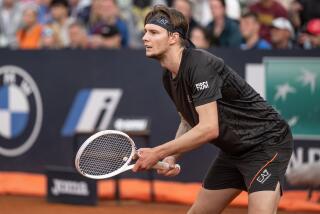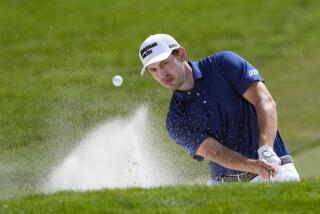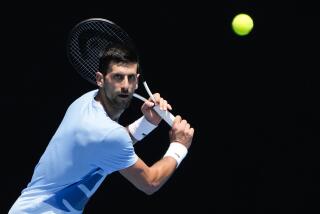BETTER BECKER : If He Could Do It All Over, He Wouldn’t; but at 21, 2-Time Wimbledon Champion Is Coming of Age
- Share via
INDIAN WELLS — It was almost dusk in the desert. The sun had slipped behind snow-capped San Jacinto, but not before casting a warm, reddish-pink glow on the low-lying clouds.
From behind his sunglasses, the world must have looked even darker to Ion Tiriac. In the fading light, he appeared even more sinister than usual.
A shock of bushy hair, just north of an unruly set of eyebrows, competed for attention with a mustache that rolled on like tumbleweed.
The sound of a tennis ball being thumped attracted Tiriac’s attention. He leaned against a chain-link fence at the end of an outer court at Hyatt Grand Champions, joining a small group watching a practice session.
Tiriac removed his sunglasses and smiled.
“The ball sounds good on his racket,” he said.
The ball has been sounding good on Boris Becker’s racket for quite a while now. Tiriac, his manager, said he isn’t sure whether Becker, at 21, is playing better than anyone in men’s tennis, but practicing four hours a day certainly won’t hurt his case.
Tiriac shouted something in German to Becker’s practice partner. He demonstrated the backswing of Becker’s serving motion. He seemed satisfied.
“He doesn’t need me to watch,” Tiriac said. “I do it because it pleases me.”
For a while, because of the way he burst upon the scene, Becker couldn’t please anyone, no matter how he tried.
When he was 17, he won Wimbledon. When he was 18, he won it again. When he failed to win it again, Becker, currently ranked No. 3 in the world, discovered that tennis’ greatest prize was also capable of inflicting great misery.
“He is a very old, young player,” Tiriac said.
Becker said if he could do it all again, he wouldn’t.
“If I look back and I could choose,” he said, “I would have said, maybe win Wimbledon at 21 for the first time and from then on, maybe five times in a row.”
Rarely has a champion paid a greater price for his victories.
“I came so new into the highlight of tennis,” Becker said. “I think it was built up too much, and the people expected too much because I was winning Wimbledon. But I was by far not the best player in the world.
“People a little bit confused that and they expected me to be the next No. 1,” he said. “That was quite difficult, almost impossible. So the expectations were on a level I don’t think any player could fulfill.”
But now, as sure as the sound of that ball leaving Becker’s racket, those same expectations are on the rise again.
Tiriac’s ears wouldn’t lie, would they?
Becker has already won 21 titles, seven of them in 1988, which was perhaps his best year-- if you don’t count his back-to-back Wimbledon successes, which most everyone does.
He began the year with a victory here in the Newsweek Champions Cup, a title that he will try to defend this week as a two-time champion. It was Becker’s first title in eight months. He said winning was “a stone out of my heart.”
But Becker finished the year in startling fashion.
After losing to Stefan Edberg in a rain-delayed four-set Wimbledon final, Becker was the hottest player on the tour the second half of the year, which ended with a thrilling five-set victory over Ivan Lendl in the Nabisco Masters final, and West Germany’s upset victory in the Davis Cup final against Sweden.
“In the last nine months or so, people have understood a little more of what it’s all about, about me,” Becker said. “Coming back and winning finally the Masters and Davis Cup. I think that people finally realized, ‘Hey, that guy can play tennis and he really wasn’t just a one-day flash.’ ”
A one-day flash? Could Boris Becker’s career ever be so trivialized?
Rightly or wrongly, Becker’s business is one in which success is measured only in Grand Slam victories. And for Becker, there have been none since he won Wimbledon in 1986.
Tiriac said that if Becker is patient and works hard and wants only to find out how good he can be, more Grand Slam titles will come to him just as they did at Wimbledon.
“Everybody makes their experiences good or bad,” Tiriac said. “He made them very young, and in my opinion, he didn’t make any bad experiences at all.
“If you expect overnight to become king of the road, even if you get there, you are not sometimes staying.”
Last year, Becker lost to Henri Leconte in the fourth round of the French Open. He lost to Darren Cahill in the second round of the U.S. Open when blisters on both feet limited his effectiveness.
The new year began for Becker in Melbourne, where he was upset by Jonas Svensson in the round of 16 at the Australian Open. Becker said that he had really been unprepared to play so soon after his Masters and Davis Cup victories.
He has not lost a match since.
In early February, Becker won both his Davis Cup singles matches in West Germany’s meeting with Indonesia.
In mid-February, Becker won the Nabisco Grand Prix event in Milan after defeating John McEnroe in the semifinals.
In late February, Becker won the U.S. Pro Indoor Championships in Philadelphia.
Since the Australian Open, Becker has lost only one set, to Christo van Rensburg in the quarterfinals at Philadelphia.
Regardless of how his fortunes seem to have reversed themselves, Becker said he does not consider this a period of rebirth for him.
“I wouldn’t say rebirth--I don’t think I was ever dead,” he said.
“I was never out of the top five in the last four years. But I didn’t win Wimbledon every year, I didn’t win the Masters every year. It’s just that people got to know me better, put it that way.
“If I would lose in the final or the semifinal of a tournament, which was a good effort in my opinion, I come in the press room and all ask, ‘What happened? What’s wrong? How come you can lose?’ ”
In a room at the Regent Hotel in Melbourne in 1987, Becker came to the decision to part ways with his longtime coach, Gunther Bosch. Besides becoming involved with Tiriac in the first place, it was probably the biggest decision in Becker’s young career.
Becker reasoned that he did not need a coach who often acted like a guardian, or one who was quoted in the media much more often than he wanted.
Becker did not hire another coach until the 1987 Masters, when he selected Australian Bob Brett.
Since Tiriac had known Bosch for all of Becker’s career, there was some question how he would get along with Brett.
And, perhaps more important, how his relationship with Becker might be changed by Brett’s presence.
“Bob was completely (Becker’s) choice,” Tiriac said. “I think the right choice. The results speak for themselves. We might have, from time to time, different opinions, but he’s the boss. I’m not on the court.
“I had my role in building his career,” Tiriac said. “I have a role of managing his career, now.”
When his involvement with Tiriac began, Becker was often portrayed as the meek pupil of a Svengali-type character. This was not the case, Becker said.
“It always amused me, because it was completely opposite almost,” Becker said. “The way he looked, his image, that is why it was said.”
Becker said his relationship with Tiriac has evolved into something that both of them are comfortable with.
“It has changed a lot because when I first came on the scene, I was a young boy,” he said. “He helped me a lot, in telling me how it is going to be in Stockholm or in Stratton Mountain or in Indian Wells.
“But now I am five years in the business and I am not a young boy anymore. I am a little bit experienced. He is almost not involved with me. Sure, he is a good friend, but it’s not that he has to tell me what do anymore. I ask him for advice, put it that way.”
Perhaps it would have happened under the old Bosch-Tiriac regime, but in any event, Becker has developed into a more complete player with Brett calling the shots.
The big serve is still Becker’s most lethal weapon, but he has also developed enough patience to rally from the baseline as well.
As Tiriac put it: “He can win in situations where he doesn’t serve perfectly. He is much better all-around.”
Becker said he is merely well-rounded. This is a different Becker than the 17-year-old who won Wimbledon.
His closest friends are perhaps his West German Davis Cup teammates.
He maintains an apartment in Monte Carlo, but he also has a house in Indian Wells, on the Palmer Course at PGA West.
“Basically, I don’t live a lot anywhere,” he said.
And wherever he goes, there is the maddening lack of privacy that worldwide celebrities of Becker’s magnitude always seem to encounter.
Asked if there is anywhere in the world where he is not known, Becker said: “I haven’t seen a place yet.”
It is difficult being Boris, he said.
“It’s not easy. If you could live with me for a couple of weeks, you would see. From time to time, you have big advantages of being famous, of being who I am. But a lot of times, you also miss things, like private life.
“Just the fact that when you walk on the streets, everybody is watching you and everybody is knowing you. This is quite disturbing. Some friends say, ‘How can you live this life?’ Sometimes, it’s very difficult.”
Becker’s preparation for the Newsweek Champions Cup has been rigid. Four hours a day on the practice court. Two hours in the morning in the hot desert sun and two hours at dusk in the warm stillness.
He said he considers Newsweek one of the nicest tournaments in the world, which is understandable since he has won it the last two years.
Tiriac watched more of Becker’s practice. He marveled at the power of his strokes. Then Tiriac began critiquing the hard surfaces on which Becker has to play. The constant jarring could shorten a big player’s career 30% to 40%, he said.
It may be prudent to respect Tiriac’s opinion. After all, it was he who found Becker in the first place.
So listen to the sound of the ball coming off Becker’s racket. Listen to Tiriac.
“I don’t feel there are too many people alive who know more about tennis than I do,” he said.
More to Read
Go beyond the scoreboard
Get the latest on L.A.'s teams in the daily Sports Report newsletter.
You may occasionally receive promotional content from the Los Angeles Times.










